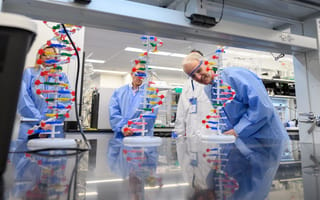“AI and data science are impacting and transforming the world around us.”
Faisal M. Khan, Ph.D., corporate vice president of AI and analytics within Novo Nordisk’s U.S. research and development team, echoed sentiments heard across many industries over the past year. And according to Dr. Khan, who is based in Washington, DC, the transformation of AI is powering dramatic shifts in pharmaceutical drug development, as well.
“It’s an exhilarating time to leverage AI and advanced analytics for drug development,” Dr. Khan told Built In. “I fully agree with a sentiment that has developed in our industry: that while AI may not completely replace traditional drug development, those who leverage AI will certainly replace those who do not embrace this critical shift in the biopharma playbook.”
“While AI may not completely replace traditional drug development, those who leverage AI will certainly replace those who do not embrace this critical shift in the biopharma playbook.”
Novo Nordisk is far from being left behind. A long-established global pharmaceutical leader that celebrated its 100 year anniversary in 2023, the company is now pioneering the course in integrating AI in its research and development endeavors in order to leverage groundbreaking technology to serve patients.
“We are not only tracking innovations carefully but also staying connected with stakeholders throughout the world as regulators and other institutions responsible for ensuring safe and effective drug discovery and development navigate these new technologies and approaches,” Dr. Khan said.

Partnering for Advancement
The company’s connections and collaborations are not only keeping drug development safe and effective, they are also pushing the possibilities for advancement ahead.
In 2023, the company announced significant partnerships with Valo Health, Microsoft and the Massachusetts Institute of Technology — all focused on expanding Novo Nordisk’s AI capabilities.
The partnership with Valo Health focuses on discovering and developing novel treatments for cardiometabolic diseases using Valo’s Opal Computational Platform and real-world patient datasets, powered by AI. By partnering with Novo Nordisk, Valo will be able to deploy its technology at scale to advance clinical development across the entire drug discovery continuum.
“We are excited to implement the full spectrum of our platform, spanning from disease characterization through clinical development, as we aim to deliver new therapeutics to benefit patients living with some of the most prevalent chronic diseases of our time,” Valo CEO and founder David Berry said at the time of the announcement.
The partnership with Microsoft provides computational services, cloud technology and AI to complement Novo Nordisk’s drug discovery, development and data science capabilities.
“The collaboration with Novo Nordisk is a great opportunity for us to collectively advance the state of the art of AI itself and apply it in a way that amplifies the creativity of human experts,” said Vijay Mital, corporate vice president of AI architecture and strategy at Microsoft.
And the partnership with MIT, a postdoctoral fellowship program, is aimed at fostering the development of new talent while moving Novo Nordisk closer to some of the outstanding research being conducted at MIT. Starting in fall 2023, the program supports an annual cohort of up to 10 postdocs for two-year terms, all dedicated to researching the best-in-class use of AI in the life sciences and healthcare space — everything from medical research to drug discovery.
“The research being conducted at the intersection of AI and life sciences has the potential to transform healthcare as we know it,” said Anantha Chandrakasan, dean of the School of Engineering and Vannevar Bush Professor of Electrical Engineering and Computer Science at MIT. “I am thrilled that the MIT-Novo Nordisk Program will support early-career researchers who work in this space.”

Investing in Growth
Dr. Khan’s own reasons for joining the Novo Nordisk team in early 2022 reflect a shared vision for utilizing AI to support collective advancement and new creative achievements.
“There’s a direct match between Novo Nordisk’s growth and my own vision for what the future of drug development could look like,” he said. “I joined to help build out our capabilities in AI and advanced analytics in support of Novo’s evolving clinical pipeline, and our growth dovetails directly with that.”
Dr. Khan has seen the company demonstrate its commitment to that growth through a deep investment in hiring and building its talented team across the United States and globally.
“Our hiring goals not only include foundational initiatives in data and technology infrastructure but also recruiting experts in AI applications for medical imaging, digital health, bioinformatics, generative AI and more,” he said. “Our activities are mapped to our research and development pipeline to ensure we can support bringing new medicines to patients.”
Once talented experts are on board, Dr. Khan and the Novo Nordisk team are focused on empowering them for success. Access to data sets, technology infrastructure, tools and training opportunities allow employees to do their best work, and as his team grows their skills, Dr. Khan sees a rising tide that will support professionals across the organization.
“Enabling experts for success both keeps their skills sharp in a fast developing world and allows experts in adjacent disciplines to learn more about AI and data science,” he said.
THE NEXT SCIENTIFIC FRONTIER
For those interested in joining the digital sciences team at Novo Nordisk, opportunity abounds. The company’s talent pipeline is currently growing, with roles across AI and digital research, scientific infrastructure and software, scientific intelligence, data management, automation, and digitalization strategy and change.
Novo Nordisk’s strategic integration of AI in drug discovery exemplifies the company’s commitment to pushing the boundaries of innovation in pharmaceuticals. Supported by Dr. Khan and other data science leaders globally, the company is not just embracing AI; it is shaping the future of drug development by leveraging cutting-edge technology to improve outcomes for patients with diabetes, obesity and other serious chronic diseases.






